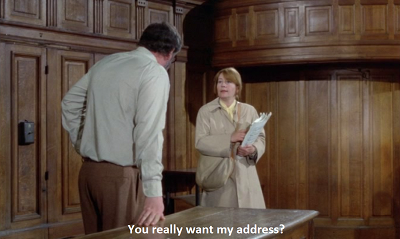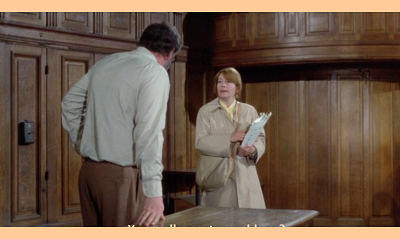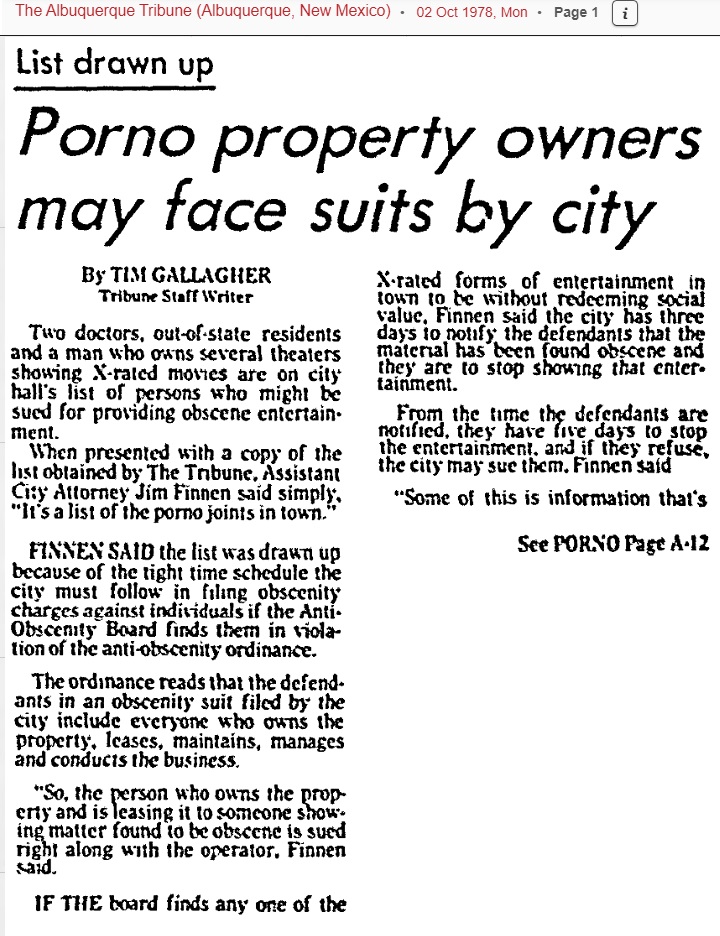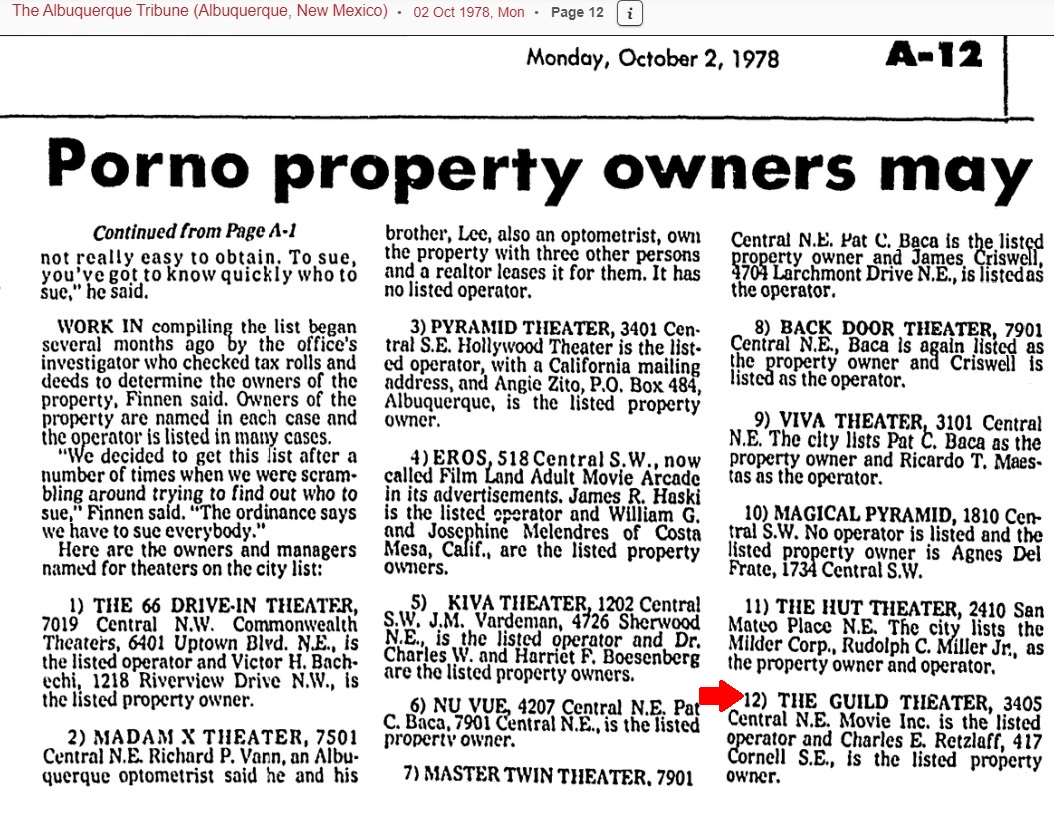Chapter 27
Dear Inspector
Dear Inspector
After being booted out of Donald Pancho’s,
I occasionally attended regular impersonal antiseptic corporate multiplex cinemas buried behind ocean-sized parking lots.
You see, once in a blue moon, those conglomerates made a mistake
and booked something that did not emanate from nicotine-filled Hollywood executive boardrooms.
Predictably, when they did schedule something a bit unusual, they got the left-overs, the rejects, not the finest works.
One such left-over reject was
Dear Inspector,
which uncharacteristically played at the
Coronado 4 for one week beginning on
Friday, 21 July 1978.
It got a
great review from a critic who didn’t notice that many of the subtitles were cropped off.
I liked the cast (Annie Girardot, Philippe Noiret) and the director (Philippe de Broca), and so I was curious enough to attend.
I knew it would be cropped, and it was, and many of the subtitles were unreadable or entirely missing.
My DVD of Dear Inspector is not taken from the US print.
Instead, it has electronic subtitles.
I do not remember exactly what font was used in the US print or what size it was,
nor do I remember exactly which subtitles were missing when the film was so horribly cropped.
Nonetheless, I shall hereby grab a frame of my DVD copy of Dear Inspector
and I shall fake it, to give you a perfectly good idea of what we witnessed quite frequently
during the showings of that movie:
 Simulation of a subtitle in Dear Inspector. |
 Simulation of Dear Inspector at the Coronado Four. |
|
The newspaper critic, of course, made not a mention of this, and probably didn’t even notice. | |
It was a cute movie, I guess, but it was a mere trifle, entirely forgettable, and, in my memory, almost entirely forgotten.
On my way out, I made a mistake. I complimented an usher on finally getting a foreign film.
He smiled.
He had never seen a foreign movie or a subtitled movie before and did not think he would find it enjoyable,
but to his surprise he quite liked it.
Another young usher butted in to express his own view that the movie was utter dreck.
He tore the movie to shreds, saying that it was a French movie, and the French cannot make good movies, because France has no culture.
France was unlike America, he said, because America was unique in having a rich culture.
He went on for about fifteen minutes, explaining that foreign movies should be avoided, because they are empty, hollow,
meaningless, because other countries have no culture.
I listened, trying not to show my exasperation, as I thought to myself:
Why? Why do I talk to people? Why do I say Hi? Why do I even acknowledge the existence of other people?
Why don’t I just keep my mouth shut?
Why don’t I just ignore everybody?
Whenever I talk to a stranger, this is the sort of disquisition to which I am subjected.
So why do I bother?
There was a problem with booking a foreign film, or any film removed from the mainstream, at a mainstream cinema.
The little cinemas, with a down-home atmosphere that gave a feeling of intimacy,
that cultivated their audiences, that were in parts of town filled with college-age kids who walked,
were the cinemas that could succeed with such off-beat programming.
The movies they presented appealed to rebels, artists, misfits, scholars, dreamers.
Corporate multiplex cinemas in the suburbs, where nobody ever walks, hidden behind mile-long parking lots,
do not and cannot cultivate the same audience that the down-home cinemas have already cultivated.
Suburbs are made up of business executives, accountants, and so forth, who are concerned about their mortgages and about climbing the corporate ladder.
They cannot be bothered by a French movie that has English subtitles and that exhibits no culture that they can recognize as such.
The auditorium was nearly empty during
Dear Inspector, as I was certain it would be.
Nonetheless, it was reprised in September,
allegedly
in response to public demand.
Yeah, right.
What must have happened was that the exchange ran out of prints of other viable films,
and the Coronado 4 probably still had the print in the booth.
So, the manager just made a phone call to the booker to say he would run it another week.
Well, the Albuquerque Journal,
Sunday, 20 August 1978, p. D-4 ,
had a different explanation:
“‘Dear Inspector’ didn’t do business until the last day.
This has encouraged Commonwealth to bring the film back on Aug. 30.”
If that is true (highly unlikely), then Commonwealth should have held it rather than let it vanish for a few weeks.
In theatre and cinema, once the momentum is lost, it is lost.
There is no bringing it back.
So that I could finally see the entire image and all the subtitles,
I attended again on
Saturday, 5 January 1980, when it reappeared at the Galería Twin downtown.
After Commonwealth had given up the lease, the Hoffmantown ownership contracted to run the cinema in about mid-August 1979,
and I attended the foreign flicks, even though many were noticeably cropped.
As I feared, this particular presentation was no better.
The picture was cropped and many of the subtitles were missing, just as had been the case at the Coronado 4.
After the show, I went to the booth and pointed this out to the projectionist, who said that he had noticed the problem.
“Yeah, I don’t know what to do about that.”
I opened the lens cabinet and pointed out the aperture plate marked 1:1.66 and the lens immediately beside it, also marked 1:1.66.
I told him to use those.
I stayed to see the show again.
He swapped the aperture plate, but did not swap the lens.
So the top of the picture was on the ceiling, and the bottom of the picture was on the wall beneath the screen.
After a few minutes, he pulled that aperture plate out and slid in the usual 1:1.85.
Oh, what’s the use? Why do I even try?
I would have been happier not to see movies at all, if seeing them meant to see them massacred.
When home video hit the stores in 1977 or thereabouts, I was relieved.
Then I discovered that the videotapes were often much worse than the presentations at cinemas.
There have been improvements since then, but even movies on DVD and Blu-ray
are cropped, re-edited, retimed, remixed, sped up, slowed down, reframed, stretched, scrunched, futzed with in countless ways.
There must be a federal law somewhere on the books, or perhaps an international treaty,
that forbids any film from being shown the way the filmmaker wants it shown.
I mean, let’s put it this way.
Suppose you’re a passenger on an ocean liner,
and one day you see that the ship is headed directly towards an iceberg.
You dash up to the captain and say,
“Captain! Captain! There’s an iceberg ahead!”
And suppose the captain replies,
“Yeah, I don’t know what to do about that.”
Or, for instance, you purchase a ticket to admire the paintings that have just been put on display at your local art gallery.
You walk in, but you notice that the pictures are backwards,
so that you can see only the backs of the frames.
You approach a guide to say,
“Excuse me, but we can’t see these paintings.
They’re not displayed properly.”
Blank expression. Silence. Then:
“What do you mean? They’re hanging on the walls.”
Or, for instance, you purchase a book, but the pages are trimmed so tightly
that the top, bottom, left, and right ten characters are missing throughout,
and, further, the first and last page of each chapter is missing.
You take it to the clerk to demonstrate the problem and to ask for an exchange.
Blank expression. Silence. Then:
“I don’t see any problem. I can see words in it.”
Or, for instance, you go to a high-class restaurant to order its famed posole.
The waitress delivers your dish, but there’s no hominy anywhere on the plate.
You point out to the waitress, “Excuse me, but where’s the hominy?”
Blank expression. Silence. Then:
“You ordered posole, right? This is the posole dish. So what’s the problem?”
Manager: “Oh these customers.
All they like to do is complain.
Call the cops to take ’em outta here.
Tell ’em we’ll have ’em arrested if they ever try to come back.”
Or, as one cinema manager explained to one of his employees, concerning me:
“What’s this guy complainin’ about? We are NOT professionals!
I’LL F***IN’ KILL HIM IF I EVER SEE HIM IN HERE AGAIN!!!!!”
The Albuquerque Tribune was only recently added to Newspapers.com, and so I just now discovered the below article.
It is stunning.
It is head-spinning.
It is confusing.
Take a look:
Part of the headline on the jump page is cropped off,
a few of the addresses are wrong,
but far worse was the accusation that The Guild was a porno house.
It was most definitely not.
The Guild had not run porn in more than seven years, and that was under a previous ownership.
What’s more, The Guild had been closed for more than a year when this article was published.
It was just sitting there empty.
If memory serves, all that was written on the marquee was an encouragement to visit Donald Pancho’s.
How on earth could any city authority conclude that The Guild was a porno house?
What else do city authorities get totally wrong?
Despite the idiocy, this brings up something interesting:
Who in the bloody heck was Charles Edward Retzlaff?
Zo, I look him up.
Born 8 Aug 1897 in Saint Joseph, MO.
Died 20 May 1988 in Albuquerque.
He was the
supervisor of maintenance engineering at UNM, he resided at 417 Cornell Dr SE, and he retired in 1972.
I do not immediately see any connection between him and 3405 Central Ave NE.
So, this remains a bit of a mystery.
Text: Copyright © 2019–2021, Ranjit Sandhu.
Images: Various copyrights, but reproduction here should qualify as fair use.
If you own any of these images, please contact me.
Images: Various copyrights, but reproduction here should qualify as fair use.
If you own any of these images, please contact me.


